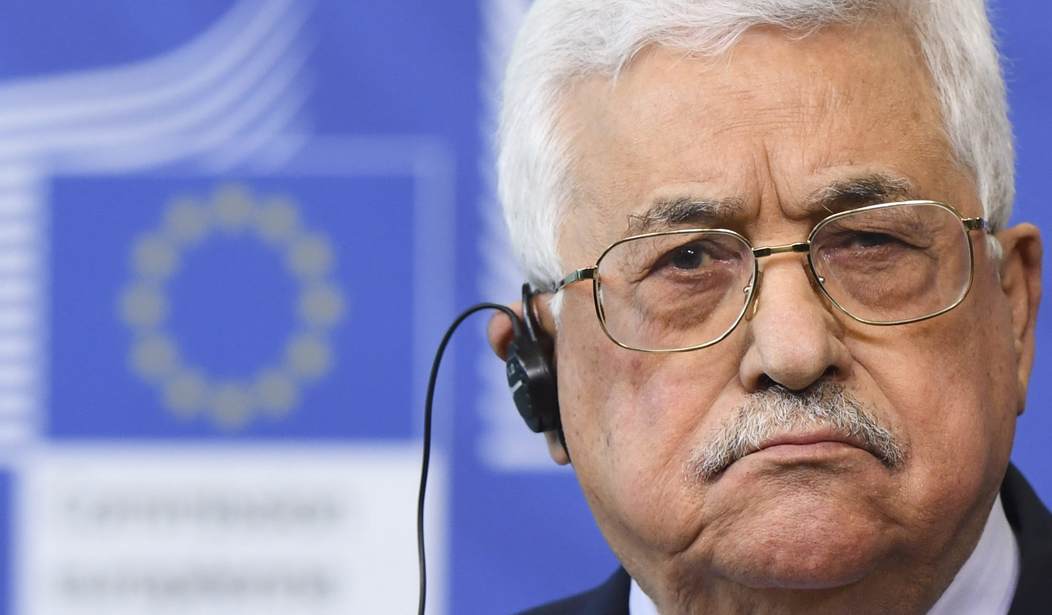From Israel, the Trump administration’s moves in the Middle East look encouraging so far.
There’s been the tough response to Bashar Assad’s sarin-gas atrocity; the highlighting of Iran as regional mischief-maker; the strengthening of tacit Israeli strategic allies like Saudi Arabia and Egypt; and of course, a reset with Israel itself after eight years of the Obama administration’s hectoring and accusations.
Now, however, President Trump is preparing for another Middle East move that is raising questions and doubts in Israel. On May 3, Palestinian Authority president Mahmoud Abbas will be hosted by Trump at the White House.
Questioned about the meeting, White House press secretary Sean Spicer defined the Trump administration’s ultimate goal:
[A] conflict-ending settlement between the Palestinians and Israel.
Israel, for its part, began seeking an end to the conflict in 1993 with the launching of the Oslo peace process. A quarter-century of terror, rockets, and relentless Palestinian delegitimization of Israel later, a survey published late last month found fewer Israelis than ever — 36%, down from 60% in 2005 – felt Israel could risk withdrawing from the West Bank.
Shortly thereafter, a review of Palestinian attitudes found even less reason for optimism about a “conflict-ending settlement.” Dan Polisar of Jerusalem’s Shalem College examined no less than 400 surveys of Palestinian opinion, and found that a majority of Palestinians reject the much-vaunted “two-state solution.”
The majority instead favors a “one-state solution”: Israel’s obliteration.
A summary in The Tower of Polisar’s lengthy report notes that an average of 54% of Palestinians rejected a two-state solution based on the most generous Israeli terms possible, and that in the two most recent polls the figure rose to 61%. Further:
[T]hose strongly opposed to such a deal outnumbered those strongly supporting it every time — usually by an average of greater than 3 to 1.
Daniel Pipes, in a response to Polisar’s report, says:
[Polisar] convincingly establishes that Palestinians collectively hold three related views of Israel: it has no historical or moral claim to exist, it is inherently rapacious and expansionist, and it is doomed to extinction.
Where Palestinians get such views is no mystery. Still another report published this month, this one by the Institute for Monitoring Peace and Cultural Tolerance in School Education (IMPACT-se), finds that the Palestinian Authority’s first- to fourth-grade textbooks not only have not improved, but have undergone an “alarming deterioration.”
[The PA’s 2016/17 elementary school curriculum] teaches students to be martyrs, demonizes and denies the existence of Israel, and focuses on a “return” to an exclusively Palestinian homeland.
The CEO of IMPACT-se told The Times of Israel that the textbooks, by portraying students as future martyrs, give the message that “these children are potentially expendable.” Meanwhile, Israeli cities like Haifa and Jaffa are presented as Palestinian.
All of this — to put it mildly — casts the Trump administration’s grandiose optimism about a “conflict-ending settlement” in a dubious light.
But is there no harm in trying? Are holding talks beneficial no matter the outcome?
Unfortunately, the past points to yet another futile Israeli-Palestinian diplomatic process causing deadly ramifications. Several times, failed diplomacy has precipitated a wave of Palestinian terror. This is a large risk to take in the absence of any reasonable hope of gain.
The Trump administration would be utilizing valuable energy, resources, and attention at a time when much of the Middle East is facing catastrophe. Much more urgent issues — only some of which are the Syrian, Iraqi, Yemeni, and Libyan wars, the terror onslaught in Egypt, and Iran’s ongoing armament and promotion of terror — deserve the United States’ attention. For Israel as well, yet another “process” means a major diversion of energy and risks political instability at a time when the Netanyahu government is leading the country to economic achievement, and has kept its borders mostly quiet.
Finally, taking yet another shot at what has failed so persistently in the past — a diplomatic resolution of the conflict — inhibits the introduction of realistic, fresh approaches to the problem. For example, the United States could focus on working steadily to convince the Palestinians that Israel is here to stay.
The Trump administration needs to tread carefully before embarking on what appears, based on all indications, to be an ill-starred venture.









Join the conversation as a VIP Member